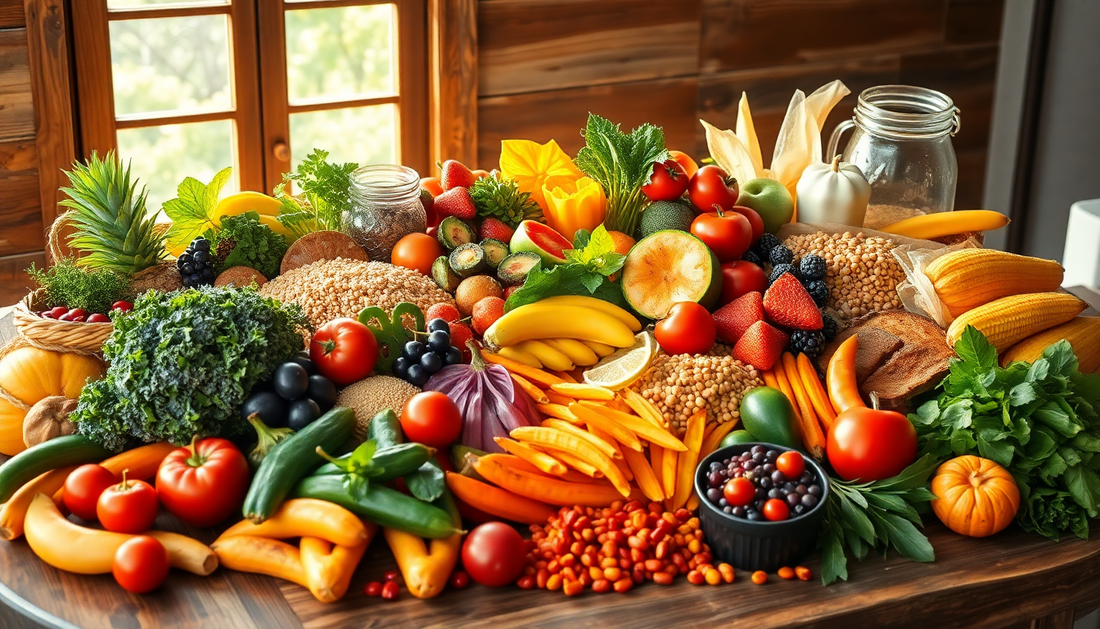
A Beginner’s Guide to Transitioning to a Plant-Based Diet
Share
Embarking on a plant-based diet can be a transformative journey, offering numerous benefits for your health, the environment, and your culinary exploration. Whether motivated by improved well-being, sustainability, or curiosity, transitioning to a plant-based lifestyle can be a rewarding and empowering experience. This guide provides practical steps, nutritional tips, and strategies to make your transition seamless and sustainable.
What is a Plant-Based Diet?
A plant-based diet prioritizes whole, unprocessed plant foods such as fruits, vegetables, whole grains, legumes, nuts, and seeds. While not as restrictive as a vegan diet, a plant-based approach may include small amounts of animal products like eggs or dairy, depending on individual preferences (Harvard Health).
The Benefits of a Plant-Based Diet
Adopting a plant-based lifestyle is linked to numerous health benefits, supported by extensive research:
- Reduces Risk of Chronic Diseases: Lowers the likelihood of heart disease, type 2 diabetes, and certain cancers (PubMed).
- Supports Weight Management: Promotes healthy weight loss and maintenance through nutrient-dense, lower-calorie foods.
- Enhances Digestion and Gut Health: High-fiber foods improve digestion and support a healthy gut microbiome.
- Boosts Energy and Mental Clarity: Nutrient-rich foods improve overall vitality and cognitive function.
- Reduces Inflammation: Minimizes inflammation, a factor in many chronic conditions.
- Supports Sustainability: A plant-based diet has a smaller environmental footprint compared to animal-based diets (BMJ).
Transitioning to a Plant-Based Diet: A Gradual Approach
Transitioning doesn’t have to be all-or-nothing. A gradual approach ensures sustainability and enjoyment.
1. Start Small
Begin with one or two plant-based meals per week. Replace meat-based dishes with plant-based alternatives like vegetable stir-fries, lentil stews, or grain bowls.
2. Explore New Ingredients
Experiment with a variety of whole foods such as leafy greens, legumes, nuts, seeds, and grains. Trying new recipes can keep your meals exciting and satisfying.
3. Embrace Flexibility
Transitioning is a journey. Allow yourself to make adjustments and find what works best for your lifestyle and preferences.
Essential Nutrients in a Plant-Based Diet
While a plant-based diet can meet all nutritional needs, paying attention to specific nutrients is crucial:
Protein
Plant-based protein sources include legumes, tofu, tempeh, nuts, seeds, and whole grains. A varied diet ensures sufficient amino acids.
Iron and Vitamin B12
- Iron: Found in leafy greens, lentils, chickpeas, and fortified cereals. Pair with vitamin C-rich foods (like citrus fruits) for enhanced absorption.
- Vitamin B12: Often absent in plant foods. A B12 supplement is recommended to meet daily requirements (NIH).
Omega-3 Fatty Acids
Plant-based sources include walnuts, chia seeds, and flaxseeds. A supplement derived from algae can help meet omega-3 needs.
Meal Planning and Preparation
A well-stocked pantry and simple recipes make plant-based living more accessible:
Stock Your Pantry
Include staples like whole grains, legumes, nuts, seeds, and a variety of spices and herbs.
Simple Recipe Ideas
- Soups: Lentil or vegetable-based soups.
- Stir-Fries: Packed with colorful veggies, tofu, or tempeh.
- Grain Bowls: Combine quinoa, roasted veggies, and tahini dressing.
Navigating Social Situations
Eating Out
Research plant-based-friendly restaurants and review menus in advance. Don’t hesitate to request customizations to make dishes plant-based.
Social Gatherings
Bring a plant-based dish to share and communicate dietary preferences respectfully.
Overcoming Common Challenges
Cravings
Address cravings by identifying their root causes, such as comfort or nostalgia. Replace non-plant-based foods with healthier alternatives, like jackfruit for pulled pork or coconut yogurt for dairy.
Ensuring Proper Nutrition
Consult a registered dietitian to ensure nutritional adequacy and explore supplementation if needed (Cleveland Clinic).
Supplementation for Plant-Based Diets
While a well-planned plant-based diet meets most needs, supplements can help ensure optimal health. Vita4Life! offers high-quality, fast-dissolving, filler-free vitamins tailored to plant-based lifestyles.
Recommended supplements include:
- Vitamin B12
- Iron (if deficient)
- Omega-3 Fatty Acids
- Vitamin D
Conclusion
Transitioning to a plant-based diet is a journey of growth and discovery. By embracing a gradual approach, exploring diverse foods, and addressing nutritional needs, you can achieve better health and support a sustainable future. Remember, progress—not perfection—is key. With determination and the right resources, including support from Vita4Life!, you can confidently embark on this transformative path.
Medical Disclaimer
This blog is for informational purposes only and does not constitute medical advice. Always consult a healthcare professional before making significant dietary or lifestyle changes.
